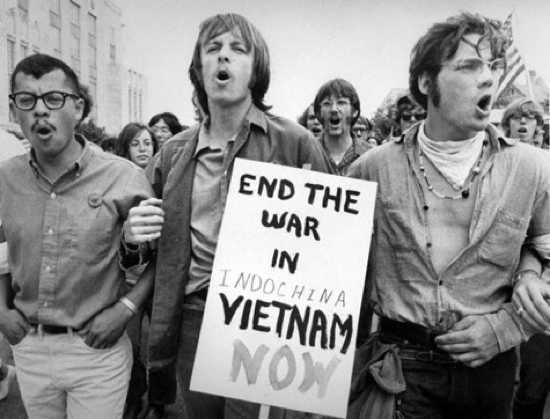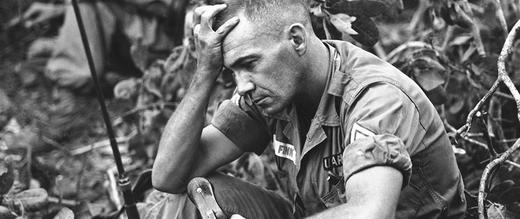The views expressed in our content reflect individual perspectives and do not represent the authoritative views of the Baha'i Faith.
Let equity be your army, reason your arms, and pardon and forgiveness your character and nature. – Abdu’l-Baha, Baha’i Scriptures, p. 190.
Once I had the distinct privilege of getting to know a World War II conscientious objector.
 As a Baha’i and a Vietnam War conscientious objector–which meant that I got drafted and went to war in Vietnam without a weapon–I had a natural interest in others who had similarly refused to fight and kill.
As a Baha’i and a Vietnam War conscientious objector–which meant that I got drafted and went to war in Vietnam without a weapon–I had a natural interest in others who had similarly refused to fight and kill.
But WWII? Whoa–that was very different. During the Vietnam War a global peace movement had developed. At least some of the people I met then understood why I wouldn’t kill anyone, and some even sympathized. But during the war fever of the 1940’s, during what many people ironically now call “The Good War,” conscientious objectors had a much harder road.
Lots of countries used to execute conscientious objectors, but by the ‘40’s things had started to change. Some spent many years in prison for their refusal to kill. Others were beaten, shunned, forced out of their hometowns, or forced to work at menial, low-paying jobs in terrible conditions for the entire course of the war. My friend Bill Webb went to prison for four years. Mostly, he told me, the prisoners broke up concrete with sledge hammers for twelve hours a day, seven days a week, year after year.
Bill grew up as a Quaker. In his religion, they took the Ten Commandments and the peaceful message of Christ seriously. His religious training convinced him that “Thou shalt not kill” wasn’t just a suggestion or a platitude—instead, for Bill, it meant that God had directly spoken, forbidding him from taking a human life. So he refused to make war, and for his principled stand, he suffered.
Can you imagine a world where everyone felt that way?
I asked Bill once why he did it, and his simple answer struck me so forcefully and so profoundly that I’ve never forgotten it. “Just tryin’ to follow the law,” he said.
So that’s maybe the best good reason not to kill anyone: because God asks us to refrain from violence and murder. That higher law, given to us repeatedly by God in every world religion, applies to everyone.
The Prophets of the world’s great Faiths—Christ, Moses, Abraham, Buddha, Krishna, Muhammad and Baha’u’llah—all suffered terribly for the cause of peace, unity and harmony among humanity. We know the stories of most of them, but you may not know about the epic history of Baha’u’llah’s forty years of exile, torture and imprisonment. In this short summary from Abdu’l-Baha, we learn that Baha’u’llah:
…endured the most afflictive of calamities. He bore countless agonies and ills. He enjoyed not a moment’s peace, drew not an easeful breath. He wandered, homeless, over desert sands and mountain slopes; He was shut in a fortress, and a prison cell. But to Him, His pauper’s mat of straw was an eternal throne of glory, and His heavy chains a sovereign’s carcanet. By day, by night, He lived under a whirring sword, and He was ready from moment to moment for death on the cross. He bore all this that He might purify the world, and deck it out with the tender mercies of the Lord God; that He might set it at rest; that conflict and aggression might be put to flight, the lance and the keen blade be exchanged for loving fellowship, malevolence and war turn into safety and gentleness and love, that battlefields of hate and wrath should become gardens of delight, and places where once the blood-drenched armies clashed, be fragrant pleasure grounds; that warfare should be seen as shame, and the resort to arms, even as a loathsome sickness, be shunned by every people; that universal peace raise its pavilions on the loftiest mounts, and war be made to perish forever from the earth. – Selections from the Writings of Abdu’l-Baha, pp. 257-258.
Baha’u’llah suffered terribly so we could live in a peaceful world. The Baha’i teachings say that war can only “be made to perish forever from the earth” when Baha’u’llah’s message of peace penetrates and human hearts change. Every individual who agrees to participate in war, who picks up a weapon and intends to use it to kill, retards the progress of universal peace.
But Baha’is aren’t anti-military or anti-government, and are willing to serve if it’s possible not to kill as part of their duties:
The Baha’i teachings require that followers of the Faith obey the laws of the government under which they live. Baha’is do not on the grounds of religious conviction seek to abandon their obligations as citizens; instead, they are able to reconcile their fundamental spiritual convictions and their civil obligations as citizens by applying for non-combatant service under the existing laws and regulations. They try to serve as members of the Armed Forces in the medical corps or in any capacity in which they may legally maintain a non-combatant status regardless of the effect which that may have on their personal safety, convenience, the kind of activity they must discharge or the rank to which they may be assigned. – The Universal House of Justice, September 20, 1965.
Of course, you have to make the decision yourself. Many of the world’s armed forces no longer draft or conscript their soldiers, so if you’re fortunate, you may never have to face this tough question. But if you’re thinking about joining the military, or know someone who is, you might want to ponder long and hard about it, and weigh the decision in the light of that higher law.

















Comments
Sign in or create an account
Continue with Facebookor